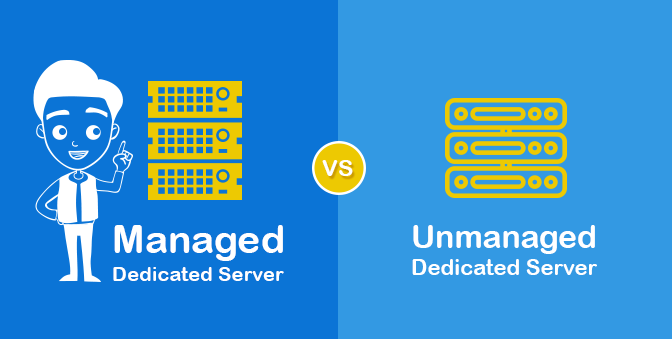As with every successful online entity, comes a time when it outgrows its hosting. For most small to medium websites, shared hosting is enough. This type of hosting offers only a portion of a server’s hard drive. All other resources like the processor, RAM and bandwidth are shared among the users. Shared hosting is a cheap starting point until the needs for additional space, computational power and Privacy become unbearable.
At this point, the most popular option to ensure continuous growth is Dedicated Servers. With this service, the user rents the whole server, including all resources. It costs more than shared hosting but allows for a vast array of heavy duty operations as well as increased privacy and security, since there is no one else using the same server.
Dedicated servers come in two types of Account – Unmanaged Dedicated Server and Managed Dedicated Server.

Unmanaged Dedicated Servers, still at a higher price point than shared hosting, are cheaper than Managed Dedicated Hosting. However, all maintenance required is in the hands of the user. Updates, reboots and software integration are the sole responsibility of the customer. Unmanaged hosting is a great, cost-effective solution for people or companies with enough knowledge to keep the server operating at its maximum. When it comes to only one server the savings are not impressive, for the cluster of servers the value increases substantially. Whether it is a dedicated expert, hired on hourly basis, to maintain the server or a team responsible for the whole server infrastructure, unmanaged hosting is only suitable if the entity renting it can ensure proper maintenance.
Managed dedicated servers are more expensive than both shared hosting and unmanaged dedicated servers. The reason is; the hosting company takes care of all necessary supervision and optimization of the servers. They rely on expert personnel to maintain and update the system as well as keeping the machines running at their peaks. Operations like reboots, software installation, updating are automatically done by the hosting company. It is a great solution for people without the required knowledge, time or employees to look after the servers.
Some hosting companies facilitates migration between managed and unmanaged dedicated servers. Whether unmanaged is too much to handle or managed is too costly and unnecessary, there are hosts that would support the transfer one or both ways. This transfer frees the user to leverage further the computational power and security of dedicated servers, as well as enjoy flexibility if the situation requires it. The quality of the bandwidth, servers and support depends largely on the hosting company. Many provide general support for all of their services but at the end of the day, it all comes down to the individual provider.
Dedicated servers are very often a necessary tool for growth. The ability to rent a whole server or several allows websites and applications to operate at a higher level without the limitations of shared hosting. Pricing varies and so do the services, in quality, resources and personnel expertise. Nevertheless, most often than not, dedicated servers are the only way to ensure online growth. The choice between managed and unmanaged is more of a case whether or not the user is prepared to handle server maintenance.
Armed with this knowledge hopefully the confusion and curiosity regarding the Fully Managed and Unmanaged Dedicated Server can be put to a halt. You likely won’t be able to choose your new host in the next ten minutes, but you should at least now know the kind of questions you need to ask. Good luck and let us know if you want to try our Dedicated Hosting services at IBEE Hosting.


